Our Electric Estate
Wolfson is the first net zero Higher Education Institution in the UK, following the completion of a multi-award-winning decarbonisation project in late 2023. By transitioning to a fully electric estate, we have eliminated our Scope 1 and 2 emissions without the use of carbon offsetting. This is projected to save over 24,000 tonnes of CO2 over the next 20 years (equivalent to burning over 56,000 barrels of oil).
Wolfson was founded in 1966 on progressive principles. In 2010 the College began a long-term effort to reduce the climate impact of our buildings, installing solar panels and our first heat pump. Seeing the growing urgency of the climate crisis, in 2020 the College voted to accelerate the project and decarbonise its Grade II-listed north Oxford estate, embarking on massive retrofitting works to eliminate fossil fuel use completely on its site.
Designed by architects Powell & Moya and completed in 1974, our buildings were not designed with sustainability in mind. Wolfson’s scale and massive elevations of single glazing made it one of the least energy efficient estates within the University of Oxford. As a College, we recognised we had a duty to decarbonise. We set an extremely ambitious target to eliminate both ‘Scope 1’ emissions (emissions from fossil fuels we burn directly, e.g., gas) and ‘Scope 2’ (emissions produced on our behalf, e.g., from electricity purchased from our suppliers) before the site’s 50th anniversary in 2024.
Retrofitting an estate of this scale and complexity had never before been undertaken in the United Kingdom and posed serious engineering challenges. How to heat and power a College that houses hundreds of researchers, students and their families, all without burning fossil fuels?
Learn more in this film by the Everything Electric Show.
- As of October 2023, Wolfson has now cut 100% of its Scope 1 and Scope 2 emissions. This is projected to save over 24,000 tonnes of CO2 over the next 20 years, which would be equivalent to burning over 56,000 barrels of oil.
- We installed the UK’s first heat pump district supply network, a bespoke prototype constructed especially for the College. Rather than heating one building, our seven air source heat pumps serve a district supply network for our whole estate. Wolfson’s successful installation of this experimental system, intended as a test case, proves to councils and estate managers that it is possible to supply sustainable heating to multi-building complexes. The pumps use a CO2 refrigerant instead of hydrofluorocarbons, making them far more environmentally friendly than older models.
- We replaced over 1,000 panes of glass with high-tech C.U.in glass, which reduces heat losses by 92.3%. The College worked in close collaboration with manufacturers to design a revolutionary window frame insulation solution to prevent air leakage and thermal bridging.
- The College has invested in electric transport, which will save 8600kg of CO2 every year.
This makes Wolfson College the first Zero Carbon Higher Education Institution in the UK.
Wolfson has led the way on eliminating Scope 1 and 2 emissions, but we recognise our ongoing work relies on supply chains that extend far beyond the College. While our suppliers work to reduce their climate impact, and until they too reach net zero, Wolfson is investing in carbon offsetting programmes to mitigate the impact of these indirect ‘Scope 3’ emissions, which were estimated at 11.5% of our total in 2020-21. We continue to reduce Scope 3 emissions wherever possible by changing our working practices, reviewing our suppliers and educating our community.
Click on the map below to find out more.
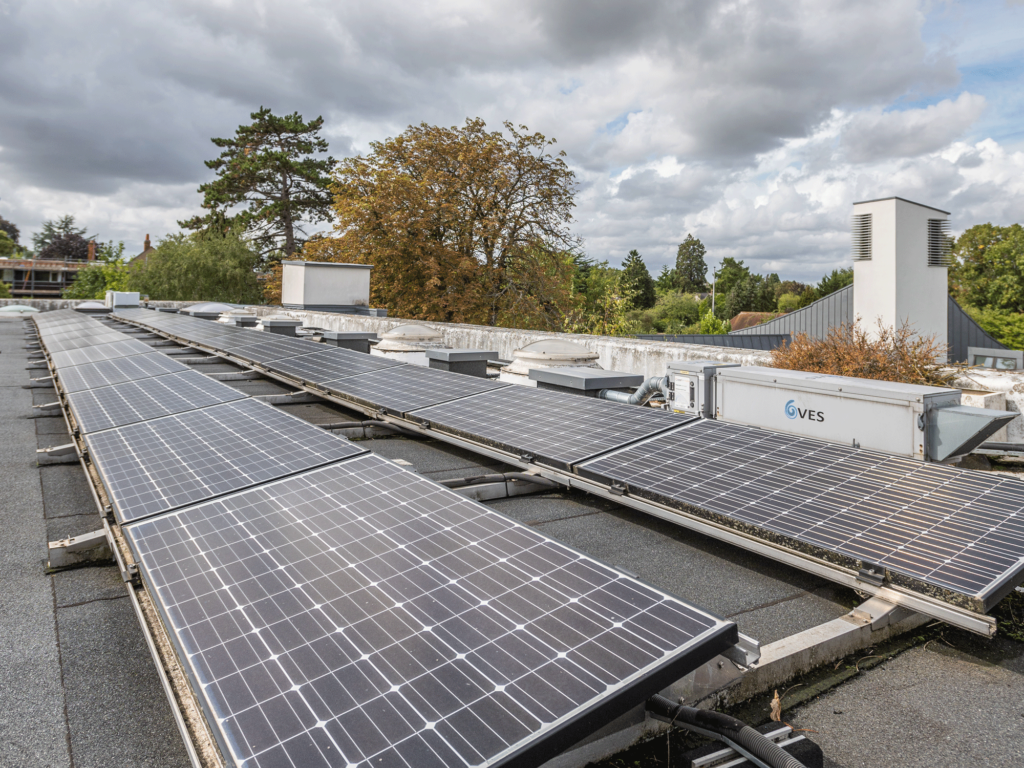
Photovoltaic Panels
The College has 44 photovoltaic panels (PV) on the roof of A Block. The PV cells in the panels don’t need direct sunlight to work – they can still generate some electricity on a cloudy day. The cells convert the sunlight into electricity and this will either be used by the College or sold to the National Grid. Our existing solar panels cover a roof area of 135m²; installing PVs on all suitable roofs (980m²) will allow us to generate about 10% of our total energy demands locally.
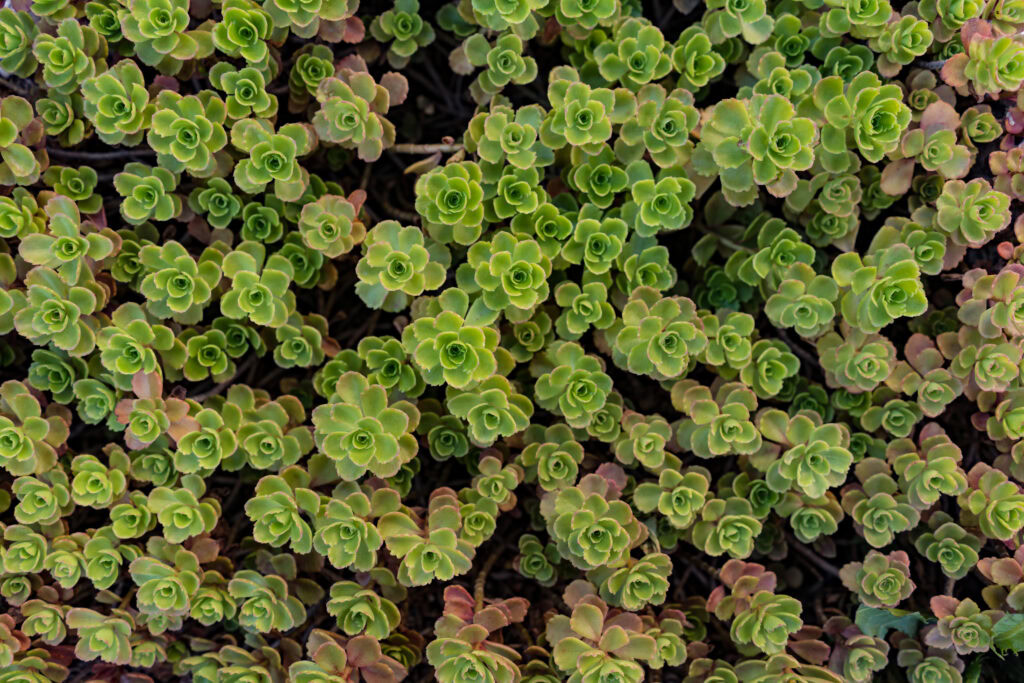
Green Roof
The new Academic wing and lecture theatre have small areas of green roof planted with Sedum, a carpet of succulent plants that flower a beautiful yellow in summer. Over the next few years, the green roof will be extended across the entire roof space of the Academic wing. You can view the current green roof from the upper level at the main entrance to the Academic wing or from Linton Road. Benefits of the green Sedum roof include the absorption of rainwater, provision of insulation, creation of habitat for wildlife, and mitigation of the heat island effect by lowering urban air temperatures. The Green Roof was supplied by Bauder, who are one of Europe’s leading roofing companies and a specialist in green roofing.
Bee Hotel
The College has very recently installed a ‘Bee Hotel’ in the Bishop’s Garden as part of the Oxford-wide campaign to provide better bee habitats and enables research into cavity-nesting solitary bees. Click here for more information.
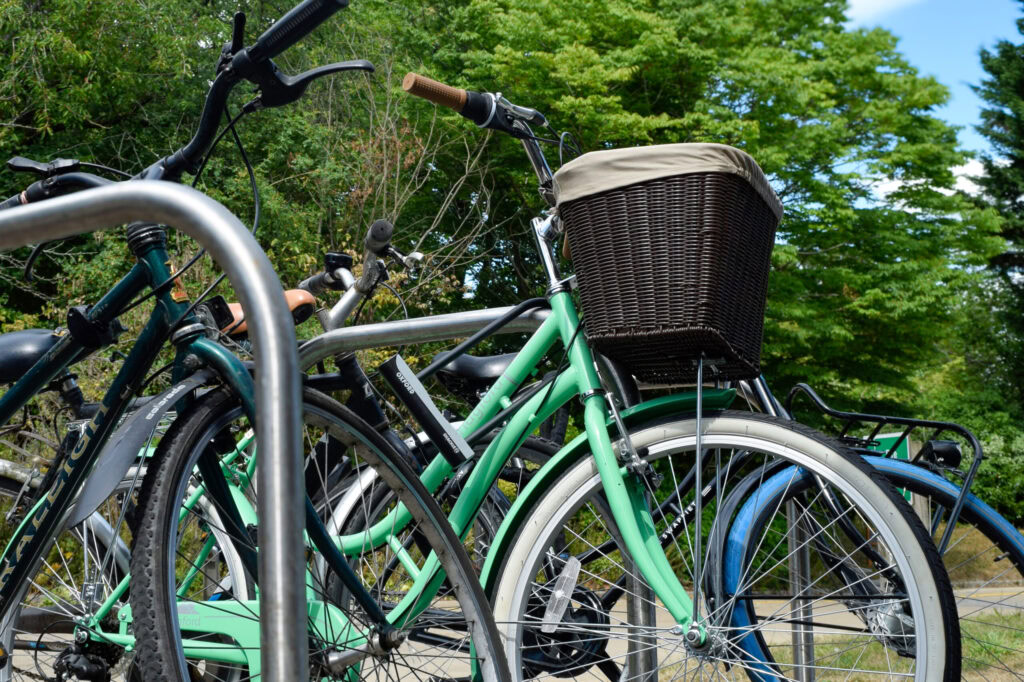
Cycling
Cycle parking, hire and a workshop is available through the College to members. The College has also recently installed a secure cycle park.
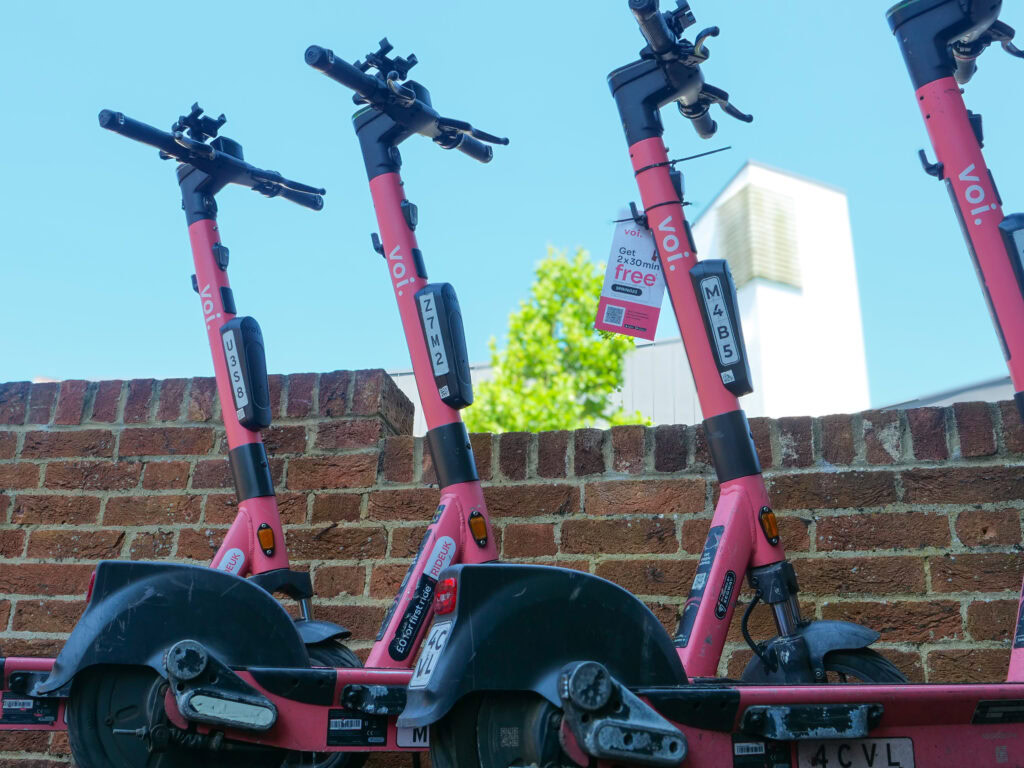
Electric Scooters
Wolfson’s staff and students are encouraged to use our fleet of electric scooters alongside our on-site bike hire scheme.
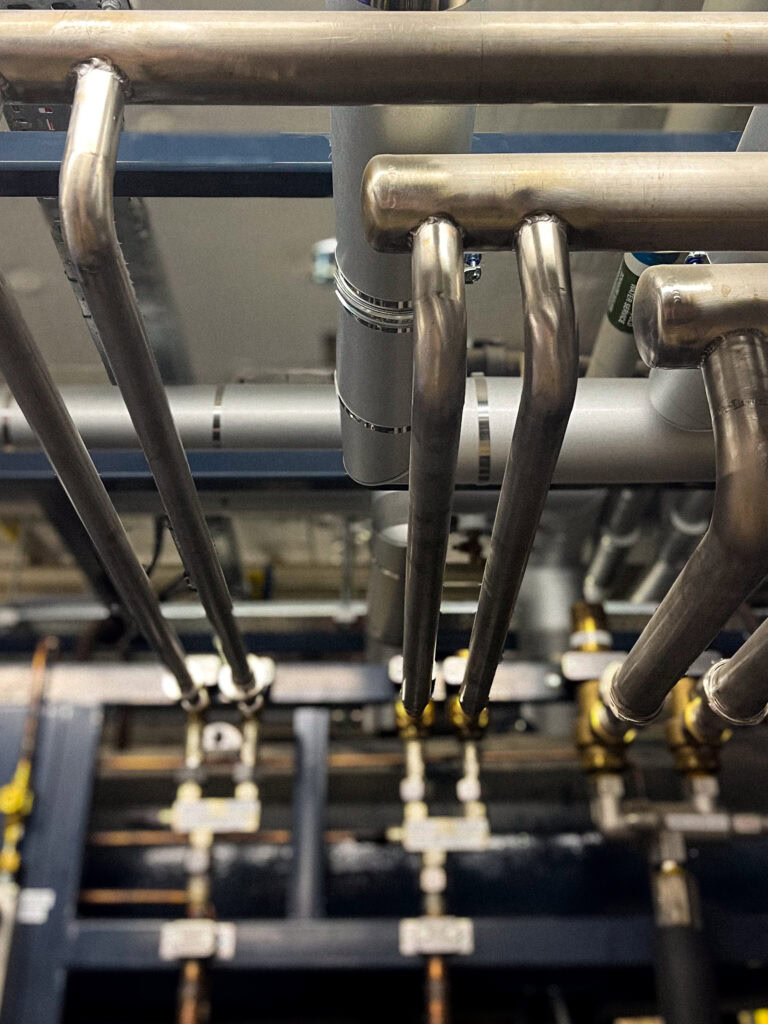
Fully Electric, Efficient Heating
Wolfson’s bespoke heat pump system is the first of its kind in the UK. Rather than heating one building, our seven air source heat pumps serve a district supply network for our whole estate. Wolfson’s successful installation of this experimental system, intended as a test case, proves to councils and estate managers that it is possible to supply sustainable heating to multi-building complexes. The pumps use a CO2 refrigerant instead of hydrofluorocarbons, making them far more environmentally friendly than older models.
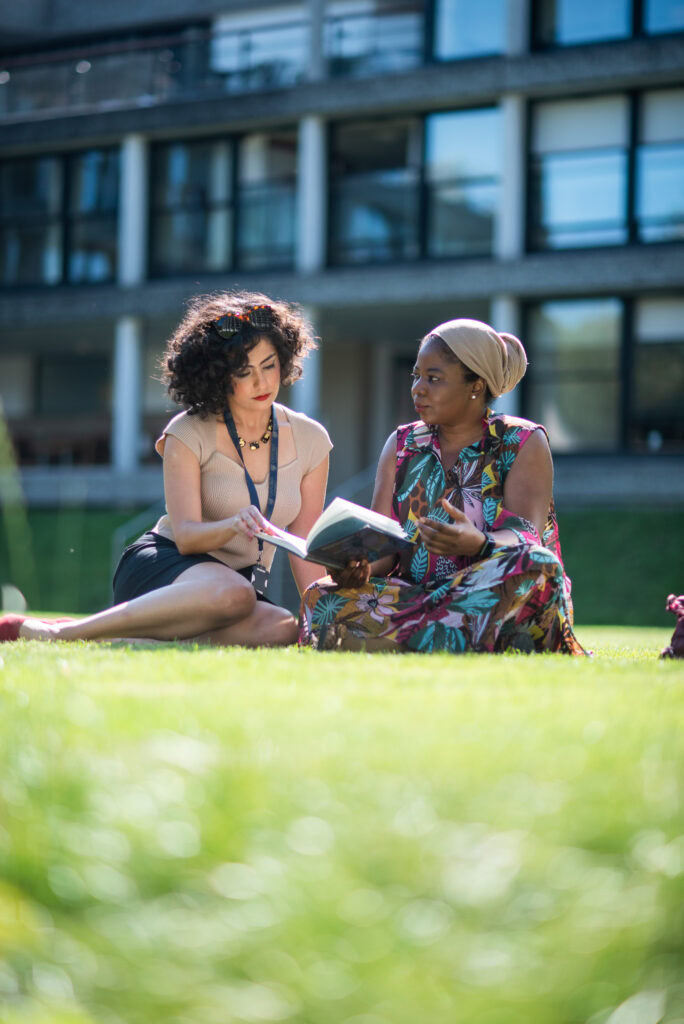
High-Tech Windows
Wolfson’s estate features massive elevations of glass, which until recently were responsible for the majority of heat loss from our buildings. In order to decarbonise the College, we replaced over 1000 panes with CU.i.n glass, which cuts heat losses by 92.3%. The College worked in close collaboration with manufacturers to design a revolutionary window frame insulation solution to prevent air leakage and thermal bridging.
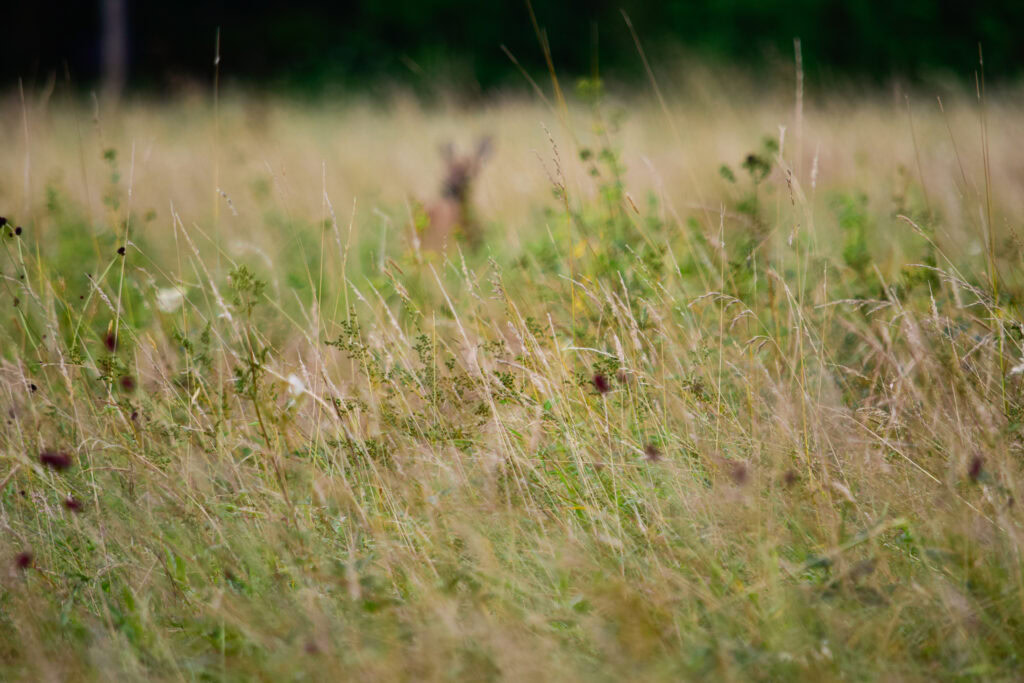
Carbon Sequestration
According to assessments by our researchers, the College’s grounds store around 800 tonnes or more of carbon. The College is committed to the responsible management of its historic water meadows, which lie over the River Cherwell, where archaeological investigations suggest a variable depth of carbon-rich alluvium 0.5-1.5m deep over the underlying gravel. These rare soils store more carbon than forest soils, and the North and South Meads alone store in the region of 400 tonnes.
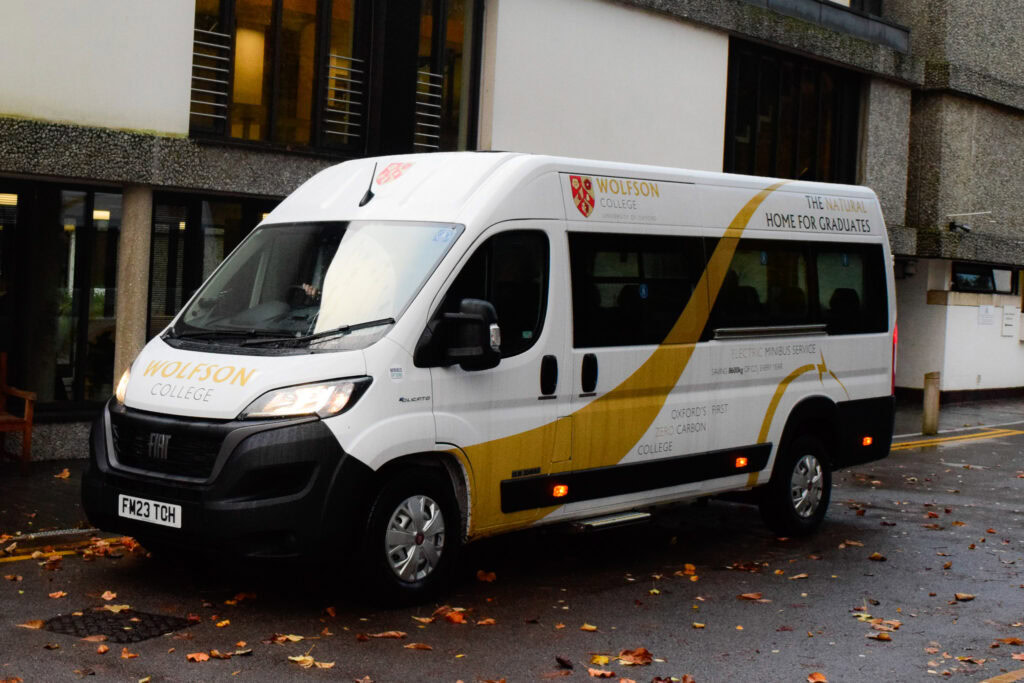
Electric Transport
Wolfson has invested in electric transport, saving 8600kg of CO2 every year.
This allows us to move staff and students between our zero carbon site and their laboratories and libraries.
Kitchen Greenhouse
The College’s kitchen team has begun growing food on-site in our dedicated Kitchen Greenhouse, with the aim of reducing food miles.
The College community has fostered a positive culture around switching to a more plant-based diet by consistently providing vegan food options. Saturday brunch now offers a popular full Vegan breakfast alternative, and during the term a vegan food option is provided with every informal meal. Out of term, vegan food options are guaranteed at least on Monday, Wednesday and Friday, but at any given time, please contact the kitchen in advance to make sure. For suggestions on recipes or feedback, please leave a comment in the guest book located at the Hall.

Photovoltaic Panels
The College has 44 photovoltaic panels (PV) on the roof of A Block. The PV cells in the panels don't need direct sunlight to work – they can still generate some electricity on a cloudy day. The cells convert the sunlight into electricity and this will either be used by the College or sold to the National Grid. Our existing solar panels cover a roof area of 135m²; installing PVs on all suitable roofs (980m²) will allow us to generate about 10% of our total energy demands locally.

Green Roof
The new Academic wing and lecture theatre have small areas of green roof planted with Sedum, a carpet of succulent plants that flower a beautiful yellow in summer. Over the next few years, the green roof will be extended across the entire roof space of the Academic wing. You can view the current green roof from the upper level at the main entrance to the Academic wing or from Linton Road. Benefits of the green Sedum roof include the absorption of rainwater, provision of insulation, creation of habitat for wildlife, and mitigation of the heat island effect by lowering urban air temperatures. The Green Roof was supplied by Bauder, who are one of Europe's leading roofing companies and a specialist in green roofing.
Bee Hotel
The College has very recently installed a 'Bee Hotel' in the Bishop's Garden as part of the Oxford-wide campaign to provide better bee habitats and enables research into cavity-nesting solitary bees. Click here for more information.

Cycling
Cycle parking, hire and a workshop is available through the College to members. The College has also recently installed a secure cycle park.

Electric Scooters
Wolfson’s staff and students are encouraged to use our fleet of electric scooters alongside our on-site bike hire scheme.

Fully Electric, Efficient Heating
Wolfson’s bespoke heat pump system is the first of its kind in the UK. Rather than heating one building, our seven air source heat pumps serve a district supply network for our whole estate. Wolfson’s successful installation of this experimental system, intended as a test case, proves to councils and estate managers that it is possible to supply sustainable heating to multi-building complexes. The pumps use a CO2 refrigerant instead of hydrofluorocarbons, making them far more environmentally friendly than older models.

High-Tech Windows
Wolfson’s estate features massive elevations of glass, which until recently were responsible for the majority of heat loss from our buildings. In order to decarbonise the College, we replaced over 1000 panes with CU.i.n glass, which cuts heat losses by 92.3%. The College worked in close collaboration with manufacturers to design a revolutionary window frame insulation solution to prevent air leakage and thermal bridging.

Carbon Sequestration
According to assessments by our researchers, the College’s grounds store around 800 tonnes or more of carbon. The College is committed to the responsible management of its historic water meadows, which lie over the River Cherwell, where archaeological investigations suggest a variable depth of carbon-rich alluvium 0.5-1.5m deep over the underlying gravel. These rare soils store more carbon than forest soils, and the North and South Meads alone store in the region of 400 tonnes.<br /> <br /> <br />

Electric Transport
Wolfson has invested in electric transport, saving 8600kg of CO2 every year.<br /> <br /> This allows us to move staff and students between our zero carbon site and their laboratories and libraries.
Kitchen Greenhouse
The College's kitchen team has begun growing food on-site in our dedicated Kitchen Greenhouse, with the aim of reducing food miles.<br /> <br /> The College community has fostered a positive culture around switching to a more plant-based diet by consistently providing vegan food options. Saturday brunch now offers a popular full Vegan breakfast alternative, and during the term a vegan food option is provided with every informal meal. Out of term, vegan food options are guaranteed at least on Monday, Wednesday and Friday, but at any given time, please contact the kitchen in advance to make sure. For suggestions on recipes or feedback, please leave a comment in the guest book located at the Hall.